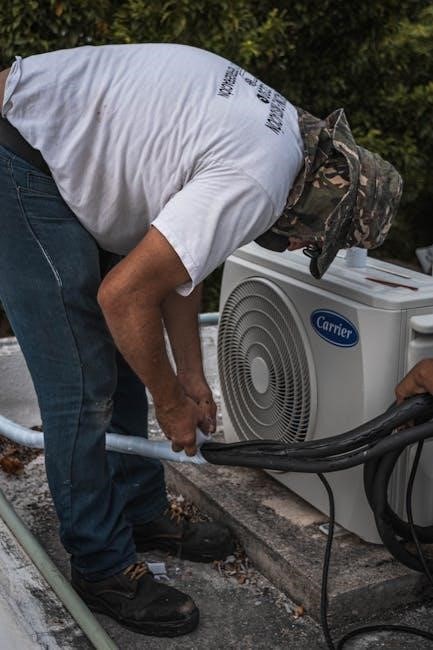Carrier APU Owners Manual: A Comprehensive Guide
Welcome to the comprehensive guide for your Carrier Auxiliary Power Unit (APU)․ This manual provides essential information on operation, maintenance, and troubleshooting․ Refer to your local Carrier Transicold dealer for detailed service information and support․
Understanding Carrier APU Systems
Carrier APU systems are designed to provide efficient and reliable auxiliary power for trucks, enhancing driver comfort and reducing idling․ These systems offer climate control, including heating and cooling, without requiring the main engine to run․ This leads to significant fuel savings and reduced emissions, aligning with environmental sustainability goals․
Carrier offers various APU models, each tailored to different needs and operational requirements․ Understanding the core components and functionalities of these systems is crucial for optimal performance and longevity․ The APU typically consists of a power unit, a cooling system, and an electrical generator․ Some models incorporate advanced features like battery monitoring and automatic engine pre-heating․
Regular maintenance and adherence to the manufacturer’s recommendations are essential for ensuring the APU’s reliability․ Consulting the official Carrier Transicold dealer network provides access to trained professionals and genuine parts, which are important for maintaining warranty coverage and preventing costly repairs․ This approach ensures the APU operates efficiently and effectively, maximizing its benefits for truck operators․
Available Carrier APU Models: Aspen and ComfortPro
Carrier offers two primary APU models: the Aspen and the ComfortPro, each designed with specific features to cater to diverse operational needs․ The Aspen APU is known for its compact design and reliable performance, making it a suitable choice for various truck applications․ It provides essential climate control and electrical power, ensuring driver comfort and operational efficiency․
The ComfortPro APU, on the other hand, offers a broader range of advanced features, including enhanced battery monitoring and cab-specific programming options․ This model is designed for drivers who require greater control over their environment and power management․ Both the Aspen and ComfortPro APUs are available in different configurations, including diesel, electric, and lithium-ion battery-powered models, allowing fleet managers to select the option that best fits their specific requirements and environmental goals․
Choosing between the Aspen and ComfortPro APUs depends on the desired features, budget, and operational priorities․ Consulting with a Carrier Transicold dealer can provide valuable insights and guidance in selecting the most appropriate APU model for your needs․
Diesel APU Systems
Diesel APU systems are a popular choice for many truck operators due to their reliability and readily available fuel source․ These systems typically consist of a small diesel engine that powers a generator to provide electrical power and a separate air conditioning compressor for climate control․ Diesel APUs offer a practical solution for maintaining cab comfort and powering auxiliary devices during rest periods, reducing engine idling and saving fuel․

Operation of a diesel APU involves starting the engine, which then drives the generator and compressor․ The system is usually equipped with controls to regulate temperature and power output, ensuring optimal performance․ Regular maintenance, including oil changes, filter replacements, and inspections, is crucial for maintaining the efficiency and longevity of a diesel APU system․
While diesel APUs provide a dependable power source, it’s important to be aware of emissions regulations and noise levels․ Newer models often incorporate technologies to minimize emissions and reduce noise pollution, making them a more environmentally friendly option․ Always consult the manufacturer’s guidelines for proper operation and maintenance to ensure compliance with local regulations․
Electric APU Systems
Electric APU systems offer an alternative to diesel-powered units, utilizing battery power to provide climate control and electrical power․ These systems are particularly advantageous for their reduced emissions and quieter operation, making them suitable for areas with strict noise regulations․ Electric APUs eliminate the need for a separate engine, relying instead on a bank of batteries that are recharged while the truck is running․
Operation of an electric APU involves drawing power from the batteries to run an air conditioning compressor and other electrical components․ The system typically includes a control unit that monitors battery levels and regulates power consumption․ When the batteries are depleted, they can be recharged by the truck’s alternator during driving or through an external power source․
Electric APUs require less maintenance compared to diesel units, as there are fewer moving parts and no engine-related maintenance․ However, battery maintenance is crucial for optimal performance and longevity․ Regularly checking battery health and ensuring proper charging are essential for maximizing the lifespan of the electric APU system․
Lithium-Ion Battery Powered APU Systems
Lithium-ion battery powered APU systems represent an advanced solution for auxiliary power needs in trucks․ These systems leverage the high energy density and lightweight characteristics of lithium-ion batteries to deliver efficient and reliable performance․ Compared to traditional lead-acid batteries, lithium-ion options offer faster charging times and longer lifespans, reducing downtime and replacement costs․
The operation of a lithium-ion APU system involves storing energy in the battery pack, which then powers the air conditioning compressor, heating elements, and other electrical loads․ The system’s control unit manages the charging and discharging processes, optimizing energy usage and protecting the batteries from overcharging or excessive depletion․
Maintenance for lithium-ion APU systems is generally lower than diesel-powered units․ However, proper battery management is crucial․ Regularly monitoring battery health, avoiding extreme temperatures, and following manufacturer guidelines for charging and storage are essential for maximizing the lifespan and performance of the lithium-ion battery pack․ These systems often include advanced monitoring features․

Key Features and Operating Modes
Carrier APUs offer key features like battery monitoring, Winter Watch engine pre-heating, and manual mode for customized settings․ These modes optimize performance, ensure battery health, and provide driver comfort in various conditions․
Battery Monitoring
Carrier APU systems incorporate advanced battery monitoring to ensure optimal performance and longevity․ This feature continuously tracks the APU and engine battery voltage, providing real-time feedback on their state of charge․ By closely monitoring battery levels, the system can automatically adjust its operation to prevent excessive discharge, which can lead to reduced battery life and starting issues․
The battery monitoring system also includes protective measures to safeguard against deep discharge․ If the battery voltage drops below a certain threshold, the APU will automatically shut down to prevent further depletion․ This feature helps to preserve battery health and ensure that the engine has sufficient power for starting․ Furthermore, the system may initiate charging cycles to maintain optimal battery levels, especially during periods of inactivity․
Drivers can typically access battery status information through the APU control panel, allowing them to monitor performance and identify potential issues before they escalate․ Regular monitoring of battery health is crucial for preventing unexpected breakdowns and ensuring reliable APU operation․
Winter Watch (Engine Pre-Heating)
The Winter Watch feature on Carrier APUs is designed to automatically pre-heat the truck engine in cold weather conditions․ This functionality is crucial for ensuring reliable engine starting and reducing wear and tear during cold starts․ The system monitors ambient temperature and engine coolant temperature, initiating a pre-heating cycle when temperatures drop below a pre-determined threshold․
By circulating warm coolant through the engine block, Winter Watch helps to bring the engine up to operating temperature more quickly․ This not only improves starting performance but also reduces emissions and fuel consumption․ The pre-heating cycle is typically controlled by a thermostat, which regulates the duration and intensity of the heating process․
Furthermore, Winter Watch can be programmed to operate automatically, eliminating the need for manual intervention․ This ensures that the engine is always ready to start, even in the coldest conditions․ Regular maintenance of the Winter Watch system, including inspection of coolant lines and thermostat functionality, is essential for ensuring optimal performance and preventing potential issues during the winter months․
Manual Mode (Cab-Specific Programming)
Manual Mode on Carrier APUs provides users with the flexibility to customize environmental controls within the truck cab․ This mode allows drivers to override automatic settings and directly manage temperature, fan speed, and other comfort parameters․ Unlike pre-set programs, Manual Mode grants full control, enabling personalized comfort tailored to individual preferences and varying conditions․
Drivers can easily adjust settings via the APU control panel inside the cab, specifying desired temperatures and fan levels․ This is particularly useful when dealing with fluctuating external weather or unique cargo requirements․ For example, drivers hauling temperature-sensitive goods might use Manual Mode to maintain precise conditions within the sleeper berth․
Furthermore, Manual Mode often includes features like adjustable timers, allowing users to program specific operating durations․ This prevents unnecessary APU usage and conserves battery power or fuel․ By understanding the functionalities within Manual Mode, drivers can optimize their comfort while maximizing the efficiency and longevity of their Carrier APU system․

Troubleshooting and Maintenance
Maintaining your Carrier APU is crucial․ This section covers common issues, solutions, and finding authorized service․ For complex problems, consult a Carrier Transicold dealer, ensuring proper diagnosis and repair to prolong APU life․
Common Issues and Solutions
This section addresses common problems encountered with Carrier APUs․ One issue is APU shutdown, potentially due to low coolant or other system errors․ Check fluid levels and consult the manual for error codes․ Battery drain can occur; monitor battery health using the Battery Monitor mode․
Winter Watch malfunctions may prevent engine pre-heating; ensure proper settings and check sensor functionality․ If the APU fails to start, verify battery connections and fuel supply․ Manual Mode programming errors might cause incorrect cab temperature settings; review the manual for recalibration instructions․ If problems persist, contact a Carrier Transicold dealer․
Troubleshooting often involves checking fuses, connections, and fluid levels․ For instance, a blown fuse could interrupt power to essential components․ Inspect wiring for damage․ Remember, safety precautions must always be observed during maintenance and repair․ Regular checks prevent major issues․
Finding a Carrier Transicold Dealer for Service

Locating a certified Carrier Transicold dealer is essential for professional APU service and support․ Carrier Transicold boasts a comprehensive network across North America, providing expert maintenance and repairs; To find a dealer, visit the Carrier Transicold website and utilize the “Dealer Locator” tool․
Input your location to identify nearby service centers․ These dealers are equipped with trained personnel and specialized tools for Carrier APU systems․ They offer services ranging from routine maintenance to complex troubleshooting․ Choosing an authorized dealer ensures genuine Carrier parts and adherence to factory standards․
Contacting a dealer provides access to technical support and warranty assistance․ They can diagnose issues, perform repairs, and offer preventative maintenance plans․ Rely on their expertise to keep your ComfortPro or Aspen APU operating efficiently․ Investing in professional service maximizes the lifespan and performance of your APU․
